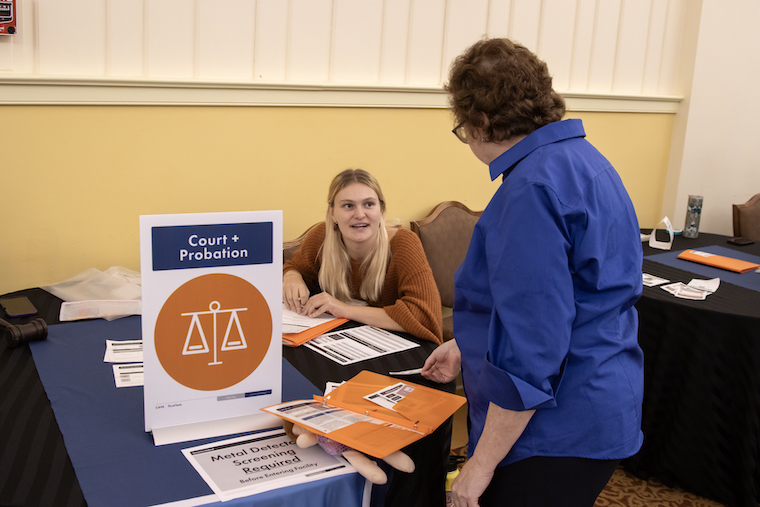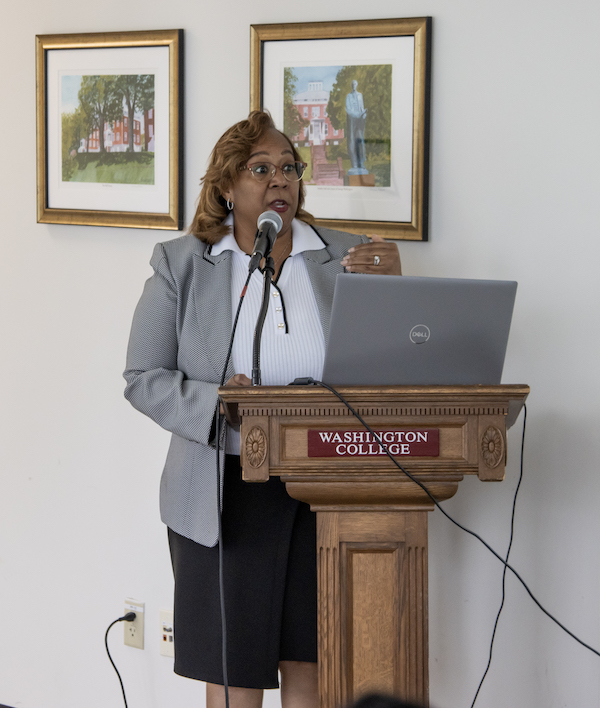Social Services Boards Learn From Peers, Professors
Washington College hosted the annual Maryland Association of Social Services Boards conference in October, highlighting academic programs with a focus on helping careers.

For two days in early October, the directors of county social services agencies and members of their advisory boards from across Maryland came together on the Washington College campus to learn more about the people they serve and issues in the field.
Four Washington professors—from education studies, psychology, and sociology—volunteered to help with programming, and many College partners provided further support, from Minary's Dream Alliance to Rebuilding Together Kent County.
The chair of the Maryland Association of Social Services Boards (MASSB) Foundation, Tony Wohlers, who is also dean of behavioral and social sciences at Harford Community College, approached Washington about hosting, having worked for the last three years to bring the conference to college campuses around the state. Professors Erin Anderson, of the sociology department, and Lauren Littlefield, from psychology, helped him arrange everything from logistics to speakers.
“I was helping to make connections,” Anderson said. In addition to lining up faculty speakers, Anderson connected Wohlers with relevant Kent County nonprofits as well. “This is strengthening some of those community and College relationships.”
Anderson also invited her students from her Sociology of Family and Introduction to Social Welfare courses to attend the conference, noting “giving them a realistic understanding of what they want or aspire to be is a really useful process.”
While hearing firsthand about challenges and frustrations from professionals in the field may sometimes steer students away from what are unquestionably difficult careers, Anderson said it can also confirm that this is the right path for them.
That was the case for sociology major Faith Poulton '26, who is also completing minors in social welfare and justice, law, and society. Along with Anderson and Littlefield, Poulton volunteered during the first event of the conference: a poverty simulation that assigned attendees the role of a real person who had faced poverty, then tasked them with meeting their needs and obligations over the course of four 15-minute “weeks,” visiting tables to simulate everything from dealing with transportation and paying rent to filling out paperwork for government assistance. (Everyone was late paying rent; four families were evicted in the simulation.)
Anderson worked at the education table (simulating community college) and Littlefield at the bank—both saw fewer of the participants than they might have expected because the people in the simulation couldn't come up with the time or resources to address those functions. Poulton worked at the simulation's court system and was struck by the impact the event had on participants, many of whom reported feeling the stress and frustration of the situation even in simulation.
“It was really enlightening, and it really opened my perspective,” Poulton said. “One thing I really love about Washington College is that there are things like this that are open to students. It was also really cool to see that there are people who are excited to welcome you into the field.”
Poulton may have found a lead on an internship at a county Department of Social Services and said that many of the conference attendees wanted to know about her plans and gave her business cards.
Washington College provided expertise as well as volunteers. The final panel of the conference addressed poverty, with two Washington speakers: sociology professor Nick Garcia and Elementary Education Field Experience Coordinator Michelle Johnson.
“As a teacher educator, I want students to do a critical examination of poverty myths.
These myths can affect what they expect of their economically disadvantaged students,”
Johnson said. “I want them to understand that they can impact factors of economic
mobility.”
As with the poverty simulation, Johnson's goal is to help students understand those growing up in that situation.
Poulton wasn't the only student benefiting from the conference. Wohlers and a colleague brought four students from Harford Community College as well, including Donna Stewart of Joppa, Maryland, who will be finishing her associate of arts in social work in the spring. Like Poulton, she found the networking at the conference most helpful and said the poverty simulation broadened her perspective, especially hearing the facilitators from ThinkTank, which created the Cost of Poverty Experience that the conference used, share their own stories of getting out of poverty.
“The personal stories made more of an impression on me,” Stewart said. “I want to work with children because they need a voice. I want to be their advocate.”
Stewart also enjoyed the opportunity to see Washington College, since her daughter is considering enrolling here for accounting.
 The conference's keynote speaker was Maryland Department of Human Services Deputy
Secretary of Operations Gloria Brown Burnett. During an address that shared an array
of statistics showcasing progress in meeting needs the past five years along with
further work to do, White noted that while much of the essential work she and her
team undertakes is behind the scenes, the conference participants, as members of county
advisory boards for social services departments, have a vital public role.
The conference's keynote speaker was Maryland Department of Human Services Deputy
Secretary of Operations Gloria Brown Burnett. During an address that shared an array
of statistics showcasing progress in meeting needs the past five years along with
further work to do, White noted that while much of the essential work she and her
team undertakes is behind the scenes, the conference participants, as members of county
advisory boards for social services departments, have a vital public role.
“Many of you are already very immersed in this information, but my plea to you is to continue to grow your understanding,” White said. “You are the people in the community who can educate others and advocate for the programs and services we need.”
- Mark Jolly-Van Bodegraven